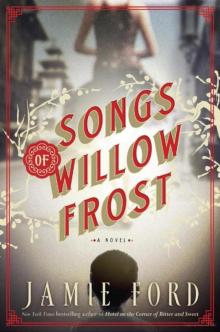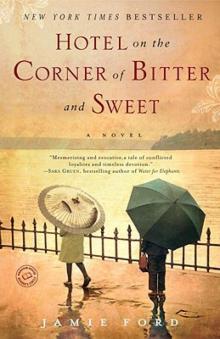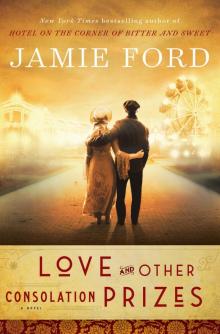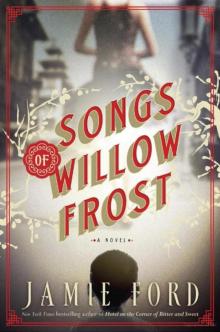- Home
- Jamie Ford
Love and Other Consolation Prizes Page 7
Love and Other Consolation Prizes Read online
Page 7
When President Taft was done speaking, the band played “Hail to the Chief,” but the crowd stayed put, cheering and shouting. Ernest watched the man whom Teddy Roosevelt had called Ol’ Puzzlehead bask in his hard-fought presidential glory, but Ernest knew full well that the patrons of the fair were merely waiting for yet another prize to be raffled off.
He overheard one of the women behind him. “Heavens! The gossip and rumors have run amok,” she said. “People have been saying that the boy must be colored—others that he’s an heir to a great fortune. The Seattle Star even speculated that the prize was actually a dwarf dressed up as a boy and that the whole affair was a practical joke. Can you believe that?” The other ladies laughed and kept murmuring.
But as Ernest watched President Taft remove his cuff link, push up the dark sleeve of his long-tailed tuxedo jacket, and reach into an enormous birdcage tumbler of ticket stubs, he knew this wasn’t a prank. The AYP had one-upped the raffled livestock and barrels of produce given away at fairs in Buffalo and San Francisco.
Ernest held his breath, and for a moment the snare drums sounded like the rattle of gunfire, the thunderous bass became the booming of cannons, the sousaphones blared—lonely boat horns, echoing on the surface of cold, black water. He blinked and saw his mother among all the spectators, a skeleton in a mandarin dress and yellow shoes, touching her heart, slowly waving goodbye. Ernest ached inside, reaching out to her, stepping toward her as she vanished into the crowd, which fell silent.
This is everything you ever wanted for me, Ernest thought.
He exhaled and blinked again as a timpani rolled to a crescendo and the president drew a single, random, destiny-changing, fate-defying bit of paper. He handed it to a man who was introduced as Superintendent L. J. Covington, who announced through a squelching microphone that “whoever has the matching ticket can immediately claim today’s prize as their very own—handsome and dark, clever and strong, donated by the Washington Children’s Receiving Home, a healthy boy. Free to a good family!”
Half the audience cheered and the other half laughed or gasped in amazement. There were even a few jeers.
“Can he sing and dance too?” a man yelled. “Does he do magic tricks?”
“I’ll take a girl who can cook!” another man heckled.
“I need a boy with a strong back,” a woman shouted.
“Get on with it!” someone snapped, as the crowd grew restless.
The superintendent raised his arms along with the other half of the winning ticket, which slowly subdued the crowd. He read the numbers into the microphone: 0-9-2-5-7-5. Silence, then the losing ticket holders collectively groaned as chatter spread through the audience. Ernest searched the crowd for someone, anyone to come forward—to shout and holler, to wave his or her hat in the air. But no one appeared. And his mother was gone, forever. Ernest felt utterly alone in a gathering of fashionable strangers.
The superintendent read the numbers again, but now in a tone that seemed more pleading than celebratory, and again, was answered with silence. Then came stirs of confusion, groans of disappointment, and eventually apathy as the president began his exit and the crowd started to disperse, off to the next amusement.
Ernest felt his fear and anxiety dissipate, along with his expectations. He shook his head. It had been terrifying that his fate would be determined by something so random as a raffle, but without his even realizing it, in these few moments, his heart had somehow conjured a glimmer of hope. He’d dared to dream and now suddenly felt like yesterday’s news, last week’s trivia. After seeing so many children come and go from Dow’s Landing, or parents visiting their sons at Holy Word, he’d never allowed himself to aspire for the life the others had, but now his heart had briefly inflated, then burst like a balloon, leaving an aching cavity inside his chest. He rubbed his eyes and swallowed what small pride he had as he realized there would be no winner today, just a solitary loser. He exhaled, long and slow, wiping a tear, as the sun found its usual hiding place among the Seattle rain clouds and the municipal band played the “Seattle Victory March.” In a fog, he watched the president wave to the crowd once more as his delegation was escorted away. Even for free, as a raffle prize, he was utterly unwanted.
Maybe it was all a joke, Ernest thought. A stunt put on by the newspapers. He hung his head and cursed himself.
Mrs. Irvine looked confused, frustrated. She beckoned him to join her, and he slowly descended the steps toward the fountain. They reached the square, where they were confronted by another group of women. To Ernest they seemed younger, hardier, and rowdier, but they were as finely appointed, as well-heeled as the stout, cotton-haired matrons of the Woman’s Building. They seemed more colorful in dress and manner—literally, because of the makeup they wore. Ernest watched as a strawberry-haired woman with a plunging neckline tucked a pinch of snuff between her cheek and gum and spat the tobacco residue at the feet of Mrs. Irvine. Then the vanguard of ladies parted as the woman Ernest had seen from afar swept to the forefront. She was the woman whose cigarette the president had stopped to light. She looked to be the junior of Mrs. Irvine by at least ten years, maybe twenty. She brushed back the plume of the blue and green feather in her hat and then fingered her necklace. The cigarette was still smoking, dangling in the holder that bounced up and down in the corner of her mouth as she spoke.
“Hello, Ida.” The strange woman held up a thick stack of tickets. “How’s your husband?” She puckered her lips and then smiled, showing her back teeth. “We haven’t seen him in our parlor in a while. Let him know that he’s always welcome.”
“Florence.” Mrs. Irvine nodded a curt greeting and gave the woman an icy stare. “Only you would have the nerve to ask the president of the United States to light your cigarette when you know they’ve been outlawed for two years. You just made him an accomplice.”
“You’re right,” the woman named Florence replied. “We’re now partners in a crime that no one in the world cares about—but you. Half the judges smoke in their chambers, my dear. Trust me.” She smiled again. “I would know. And what else have you foisted upon the good people of Seattle? Let’s see, it’s now illegal for a woman to wear pants in public, saloons must be open to public viewing—oh, and tipping of any kind is no longer allowed within the city limits. My, how you love your rules.”
Mrs. Irvine pointed to the tickets. “And the rules for the raffle very clearly said, to a good home. Not a place for a good time.” She crossed her arms and scrunched her lips as though she had just tasted something bitter.
Florence spread the tickets like a fan and waved them in front of her face, feigning coyness, if only for a moment. She blinked over the tops of the cardboard stubs and then revealed a stern countenance. She sorted out the ticket with the winning numbers and then held it up for all to see. “It took us a while to find the right one; after all, we have so many. But, as you can see, I’m here now to claim my prize. We both have the same intentions, Ida dear, we just have different methods of getting what we want…”
“Don’t you dare compare me to…”
Ernest listened to the women bicker back and forth about propriety and decorum, interrupting one another, chewing each other’s words with their mouths open, their teeth bared, their nostrils flaring, cheeks reddening. As they inched closer to each other, the day seemed to grow more confusing and unreal by the moment. Ernest observed this as their arguing became background noise, blending into the sounds of the fair—a distant rock tumbler, a melodious pipe organ, laughing children on a carousel, the glassy popping of flash powder. He noticed that in this group of painted ladies, the older women had made their faces appear younger, while the younger ones, barely out of their teens, were made up to look older. But there was a certain wit about all of them, like every look was a dare, a threat, and a promise.
They all seemed pleasant enough. Ernest thought that any one of them would be a million times preferable to the monotony of the boarding school. Where life was a song with only one
note. No melody, and no chorus, just a flat monotonous tone.
Ernest didn’t feel entirely comfortable, but he was at least intrigued by the thought of going home with any one of these gay young ingénues. He wondered where each of them lived, who their husbands were. Did they have other children?
That’s when Ernest saw the littlest one—not a woman at all, a young girl, really, and barely a wisp of one at that. Ernest noticed her as she stood on the edge of the verbal melee, in a purple knee-high dress with a monogrammed M, fringed with lace, and beguiling blond hair cut so short that she almost looked like a boy—almost. She wore an outrageous hat, similar to that of Miss Florence, the leader of the pack. But instead of peacock feathers this queer girl had a pair of stuffed hummingbirds set atop her brim. Ernest noticed her wide, luminous eyes—pools of blue ice, with freckles of summer generously sprinkled on her nose and cheeks.
They observed each other in a silent staring contest, which lasted only half a minute but stretched to infinity in grade school years, until Ernest’s tear ducts burned and he blinked his surrender. The girl rolled her eyes and gazed back. Her confounding expression seemed filled with something like loathing—like a long-held grudge for a sin he hadn’t yet committed. She stepped toward him and revealed what appeared to be the world’s most perfect candied apple—a treat that looked like a ruby atop a stick. It sparkled and shimmered like the Star of India.
She hadn’t yet taken a bite.
Ernest stirred himself from his shocked stupor and waved a polite greeting.
The strange girl regarded him with a glare. Then she looked at the candied apple that he’d clearly admired as though she’d momentarily forgotten the thing was there. She paused and seemed to appreciate her reflection in the hard, candy-coated surface. Then she tipped it upside down, holding the stick with two fingers, like the tail of a dead rat. Ernest watched as she stalked to a nearby garbage can, stared back at him, tilted her head, and dropped the apple in the trash with a hollow thump.
TENDERLOIN
(1909)
Ernest sat with his knapsack on his lap in the backseat of a lurching taxi, a jostling Model T. He was sandwiched between the large woman with the big hat and the girl who hated him for reasons unknown. Most of the other ladies had opted for the trolley, dinner in the city, and a bit of light shopping, he’d been told.
Not the family I imagined, Ernest thought, as he stared out the window and watched the sun set on the waters of Puget Sound. He felt like a tumbleweed, blown by the wind, rolling to the southern edge of town.
Mrs. Irvine had put up a good fight, even though Ernest didn’t fully understand her reasons. She had argued, grabbed the tickets, and thrown them into the air. She’d shoved Ernest behind her, and he’d watched the pieces rain down like ticker tape on a parade, which created a peculiar appearance of celebration, a joyful moment amid the bickering, until a broad-bellied man in a wool suit broke up the fracas. He fingered his walrus mustache and then reached deep into his overstuffed waistcoat, buttons ready to burst, and pulled out a gold badge. Ernest thought he had come to Mrs. Irvine’s rescue just in time, but she called the man a no-good jackal and a scoundrel. The hollering and caterwauling was the closest he’d ever heard Mrs. Irvine come to swearing.
As the taxi veered around a carriage, and Ernest thought about Mrs. Irvine possibly being on the wrong side of the law, he was compelled to reevaluate everything he’d ever been told, to reconsider everything he’d known.
For instance, he’d never been in a motorcar. He’d heard that they were ugly, noisy, graceless, foul-smelling contraptions. But as they passed a brigade of crossing sweepers, cleaning up road apples and swatting flies, Ernest thought otherwise. He settled into the polished leather seats, which smelled better than a saddled horse.
He had never once been near the mysterious part of Seattle that lay south of Yesler Way, a street better known as the Deadline. His teachers had talked for years about sewer rats that plagued the area, and rattlesnakes, and about the wolves that prowled the White Chapel District, waiting to sink their teeth into the good people of Seattle, which a local song had dubbed the Peerless City. Ernest had imagined lanky, sinuous creatures with sharp claws and tangles of mangy fur, but as he looked out at the avenue, all he saw were signs for dance halls and saloons. He even heard a fiddle playing a happy tune in the distance as the gaslights on the street corners flickered to life, turning the damp sidewalks a ruddy orange hue. Everything, from the brick buildings to the sidewalks to the lampposts and park benches, looked polished and new, even the brewers’ trucks that seemed to be on every corner.
Ernest looked up at Madam Florence. The woman hadn’t bothered to remove her hat, and the feathery plume swept back and forth against the canvas top of the motorcar as she turned her head. He tried to evaluate what kind of creature she must have been in Mrs. Irvine’s eyes.
She seemed to notice him staring. “First time below the line, I take it?”
Ernest nodded.
The woman smiled and pointed out the window. “It’s not hard to understand when you think about it. North of the line was settled by Arthur Denny—who didn’t drink. South of the line was all land owned by Doc Maynard, who, shall we say, ‘enjoyed his libations.’ So, young man, to the north you get City Hall, the courts, and the police station, and to the south we have booze, casinos, and all kinds of canoodling. That’s Seattle for you, the land of the haves and the why nots?”
Ernest thought her explanation made more sense than the schoolteacher’s fables.
“I’m Florence Nettleton, by the way. But you may call me Madam Flora.” She handed him the winning ticket. “I saved this one for you, a little souvenir of this auspicious day. After all, we’re both winners, aren’t we?” Then she pointed at the others with her cigarette holder. “This is Jewel in the front seat. She’s one of my newer girls. And that’s my baby sister, Margaret—my little hummingbird, but we all call her Maisie May. Say hello, sweetheart.”
“Just Maisie,” the girl answered without bothering to turn away from the nearest window. She removed her hat and wedged it between them.
Ernest hesitated for a moment. There were so many questions he wanted to ask. So much he wanted to know about his new family and about the White Chapel District—like how the neighborhood had gotten its name. As he looked around, he noticed a barber, a haberdasher, and a few tailors—he even saw casinos—but didn’t see a single church.
“You’ll be living here with me, at Washington Court.” Madam Flora pointed to a four-story brick building on the corner as the car’s brakes squealed and the tires ground to a halt. “Your old friend, Mrs. Irvine, once called this part of Seattle a bottomless cauldron of sin and hellfire. The Duwamish Indians, on the other hand, called this area the Crossing-Over Place; that’s how I like to think of this neighborhood. What do you think?”
Ernest stared up at the new building and shrugged. “Looks nice enough to me.”
“My sentiments exactly,” Madam Flora continued. “You’ll be the only boy here, so you’ll have your own room—lucky you—but you’ll be expected to work hard and earn your keep. Ask for Miss Amber, she’s my housekeeper, my managing partner. She’s in charge of all the help and a bit of a handful, but her heart is in the right place, even if her temper gets in the way once in a while. She’ll see that you’re properly taken care of. Run along now, darlings, and I’ll catch up with you in the morning. Jewel and I have an appointment with a tailor, so she can get fitted for a very special dress.”
Ernest put the ticket in his pocket and followed Maisie onto the sidewalk. He looked up at the tall building and out at the bustling avenue. The paved street was covered in gravel and streaked with mud from shiny motorcars, polished horse-drawn carriages, electric trolleys, bicyclists, the footfalls of scores of pedestrians—and all of them seemed content to share the road, dodging in and out, weaving around each other. Ernest couldn’t understand how so many people moved so quickly in so many different directions wi
thout accidentally killing one another. Maybe this was what Mrs. Irvine had been so concerned about.
“Welcome to the Tenderloin,” Maisie said. “Follow me.”
The building’s entrance was magnificent, with a glittering voltaic chandelier, the foyer accented with finely polished millwork. Maisie took him on a tour of the rooms on the ground floor, including the cloakroom, the library, something she called the teaching salon, and the smoking den. But it was the splendor of the grand parlor that took Ernest’s breath away. Never in his life had he seen a home so opulent. Everywhere he looked there were tapestries, lace-covered walls, plush French furniture in crimson and gold, marble cherubs with bows and arrows, angels, stoic busts of bearded historical figures, and risqué statues—bronze gods and plump goddesses he didn’t recognize. There were candles, oil lamps, mirrors, and sparkling decanters of wine and spirits. The floors were even and smooth, and the plaster walls and wood trim were freshly painted, unmarred by soot from kerosene lamps. When Ernest did finally catch his breath, he smelled rich perfume and scented tobacco, fresh-cut flowers, candles, and savory spices—sage and thyme—roasting in some unseen kitchen.

 Songs of Willow Frost
Songs of Willow Frost Hotel on the Corner of Bitter and Sweet
Hotel on the Corner of Bitter and Sweet Love and Other Consolation Prizes
Love and Other Consolation Prizes Songs of Willow Frost: A Novel
Songs of Willow Frost: A Novel